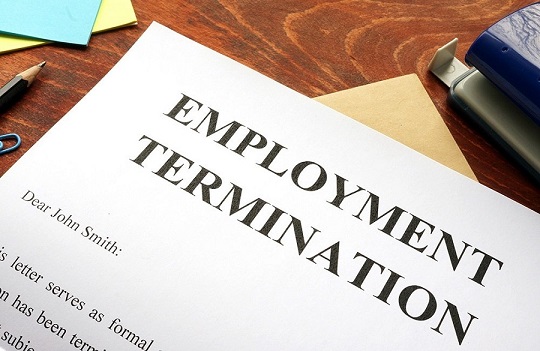
In a perfect world, you would never have to fire an employee at your dental practice. Unfortunately, you don't live in that perfect world; and there will be times when your employees fail to meet your expectations. Whether it's poor patient interactions that leave patients uncomfortable when they're in your office, a habit of showing up late, or a more serious offense like stealing from the practice, there are times when you simply need to terminate an employee for the good of the practice. Taking care of the process legally will help protect your practice and ensure that you aren't stuck in a battle to explain why you chose to fire a particular individual.
From the moment you open your dental practice, you need to set the stage to deal with the potential need to fire an employee. Start by creating an employee handbook. This handbook should include several key pieces of information, including both the fact that you are an at-will employer--that is, that you're able to dismiss an employee at any time and for any reason--and the policies and procedures you expect from your employees. Consider a code of conduct, expectations for employment, dress code, and any other information that could change the way you choose to interact with your employees, including a clear definition of harassment and discrimination policies that will help shape employee interactions with your patients.
Make sure that your employment doesn't contain anything that can be read as an employment contract. You want to avoid giving the implication that any employee has the right to continued employment with your practice, particularly if they step outside the boundaries of acceptable conduct as you've set them up. Verbal agreements can also be binding, though they are rarely problematic; for this reason, you should also be careful what you say when making an employment offer.

Terminating an employee--no matter how much trouble they've caused or how little you like them--is no one's favorite thing to do. Since you own your own practice, however, this responsibility will fall squarely on your shoulders, and it's important that you handle it properly. Design a termination policy for yourself, especially if you have a practice that is shared with other dentists.
Designate who will be responsible for firing employees and how that determination will be made. You might choose to take turns firing employees or to designate a specific individual who is better prepared to handle the situation. Your termination policy should also include the fact that no single individual should take on the task of firing employees alone; bring someone else to the meeting with you, whether that's another dentist or a trusted member of staff who doesn't have a personal investment in the employment of the individual in question.
Decide what behaviors will lead to termination. While this doesn't have to be spelled out in your employee handbook (and shouldn't be, since listing terms for termination could indicate that outside those terms, employees are guaranteed employment), it should be a policy you can refer to when deciding how to handle problem employees. Note that the terms are subject to change and can be altered at your discretion--and will more than likely need to be altered over the lifetime of your practice, as you deal with specific problems and employees.
Document any problems with an employee. If an employee has given a reason to be terminated, it should be clearly documented. Not only that, you'll need to provide information about why they were fired if they attempt to file for unemployment. Documentation can also help protect you if a lawsuit arises later. Document any cases in which an employee was reprimanded as well as any discussions you've had about the need to change behaviors or practices.
Choose your time. Firing an employee on the spot, when you're angry about a particular event or behavior, isn't the way to handle it. Instead, take the time to cool down. It's rare to have problems that won't wait until tomorrow morning.
Write down your explanation and keep it simple. You want to offer a clear explanation for why the employee was fired in order to avoid trouble down the road, which is painful for everyone involved.
When you terminate an employee, there are several necessary steps that must be taken in order to finalize that termination. Make sure that you:
Finalizing the termination process will help ensure that you've covered your practice in the event of future employment law problems. While you'd like to believe that employees will leave peacefully when they're no longer employed by your company, there are times when things won't go according to your plans--and you want to be sure that you're protected.
As an employer, there are times when you shouldn't fire an employee in reaction to something that's happened. Retaliatory discharge is a legal term that indicates that you are firing an employee for a series of specific behaviors that are not upheld as part of the at-will employment standards used in most states. These include things like:
An employee who is in the middle of filing a worker's compensation claim. If an employee has been injured throughout the course of a normal business day, completing normal duties in your practice or duties that they have been asked to perform as an employee, firing them would be seen as retaliatory behavior.
An employee who refused to break the law as part of their job duties. This might, for example, mean an employee who has refused to go outside their understanding of the law in order to protect your practice (including whistleblowing) or who has told the truth in a legal situation in spite of the fact that it doesn't reflect well on the practice as a whole.
An employee who has a contractual relationship--or, in some cases, implied contractual relationship--with your practice. This is why it's so important to spell out the terms of employment in the employee handbook and ensure that employees are aware that you are an at-will employer.
There's also a "good faith" clause that has been upheld in several unfair firing situations, when an employee completed all the necessary job responsibilities and was overall a good employee, but they were fired for no good reason. This is why most employers collect substantial information against any employee that they plan to fire.
Terminating an employee is hard, but there are times when it's necessary for the good of the practice. By ensuring that you're covered yourself legally, you'll be able to protect your practice and move out employees who aren't a good fit or who are causing problems with your regular work day, allowing for a smoother-running practice.
If you are in need of employment law advice, contact the dental attorneys at Dental & Medical Counsel today!
Frequently Asked Questions
Q: Why is it important to handle employee termination legally?
A: Handling employee termination legally helps protect your practice from potential legal battles and ensures you have valid reasons for dismissing an employee.
Q: What should be included in an employee handbook?
A: An employee handbook should include the fact that you are an at-will employer, policies and procedures, a code of conduct, expectations for employment, dress code, and definitions of harassment and discrimination policies.
Q: Why should employment terms avoid implying a contract?
A: Avoiding implications of a contract ensures that employees do not have a guaranteed right to continued employment, particularly if they engage in unacceptable conduct.
Q: What should a termination policy include?
A: A termination policy should designate who is responsible for firing employees, determine behaviors that lead to termination, and require documentation of any problems with an employee.
Q: Why is documentation important in the termination process?
A: Documentation provides evidence of reasons for termination, helps explain firing decisions if unemployment claims arise, and protects against potential lawsuits.
Q: What steps should be taken to finalize the termination process?
A: To finalize termination, take away the employee's keys, change any known passwords, and arrange for their final paycheck and termination documents.
Q: What is retaliatory discharge, and why should it be avoided?
A: Retaliatory discharge refers to firing an employee for protected behaviors, such as filing a worker's compensation claim or refusing to break the law. Avoiding retaliatory discharge is crucial to comply with legal standards and protect your practice.
Q: What is the "good faith" clause in employment termination?
A: The "good faith" clause protects employees who have met job responsibilities and were otherwise good employees but were fired without a valid reason. Employers should gather substantial information against employees before termination to avoid this issue.
Q: How can you protect your practice when terminating an employee?
A: Protect your practice by legally covering yourself, documenting issues, ensuring the employee handbook is clear, and seeking employment law advice when needed.
Q: Where can I get employment law advice for my dental practice?
A: You can contact the dental attorneys at Dental & Medical Counsel for employment law advice tailored to your practice.
At Dental & Medical Counsel, we've been instrumental in realizing the practice goals of countless dentists. Whether you're looking to purchase, launch, or sell a dental practice, our expertise is your guide. Beyond the initial stages, we're committed to ensuring your dental practice remains legally compliant.
We provide comprehensive support, including employment law protections, dental contract reviews, and assistance with dental employment agreements. Additionally, we specialize in incorporating dental practices and securing trademarks. And for long-term planning, our services extend to helping dentists with succession and estate planning. Trust us to be your partner in every step of your dental practice journey.
.jpg?width=300&height=396&name=Ali%20Website%201_edited%20(1).jpg)
About Ali Oromchian, Esq.
Your Dental Lawyer
Ali Oromchian, JD, LL.M., is a leading legal authority in dental law and the founding attorney of Dental & Medical Counsel, PC, with over two decades of experience. His deep connection to dentistry comes from his wife's nearly two-decade-long career as a pediatric dentist.
This personal insight fuels his dedication to empowering dentists to navigate their legal challenges and achieve their practice goals. In doing so, Ali has helped thousands of doctors open their practices while maintaining legal compliance.
Ali is frequently quoted and contributes articles to dental publications, including the California Dental Society, Progressive Dentist, Progressive Orthodontists, Dentistry Today, Dentaltown, and The New Dentist magazines, further showcasing his commitment to the dental community.

Stay updated with industry news!
1904 Olympic Blvd, Suite 240
Walnut Creek, CA 94596
Phone: 925-999-8200
Fax: 925-884-1725
frontdesk@dmcounsel.com
| Monday | 8:00AM - 6:00PM |
| Tuesday | 8:00AM - 6:00PM |
| Wednesday | 8:00AM - 6:00PM |
| Thursday | 8:00AM - 6:00PM |
| Friday | 8:00AM - 6:00PM |
| Saturday | Closed |
| Sunday | Closed |